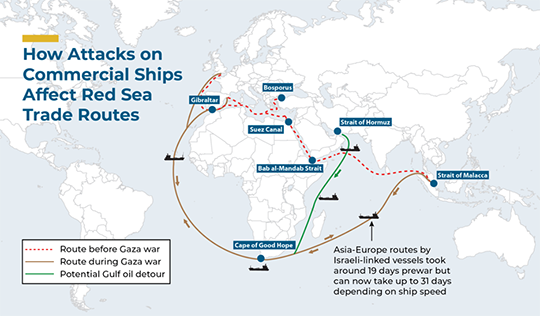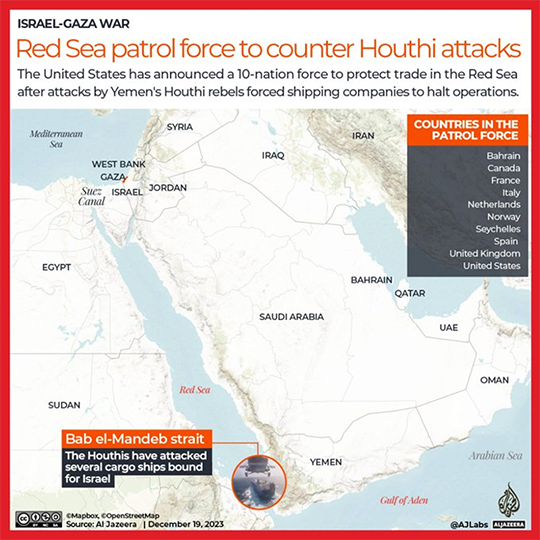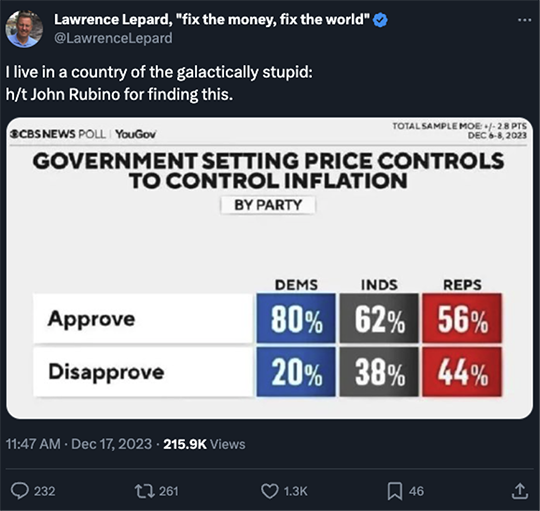Back to the 1800s
![]() Supply Chains Revert to the 19th Century
Supply Chains Revert to the 19th Century
 Leave it to colleague Sean Ring to sum up a FUBAR situation in one pithy sentence: “In essence, yes, a bunch of goatherders have just stopped world trade,” he writes in today’s Rude Awakening.
Leave it to colleague Sean Ring to sum up a FUBAR situation in one pithy sentence: “In essence, yes, a bunch of goatherders have just stopped world trade,” he writes in today’s Rude Awakening.
As we mentioned briefly yesterday, oil prices jumped on the news that BP had suspended oil shipments via the Red Sea. In the preceding days, container-shipping giants like Maersk and Hapag-Lloyd had done the same thing.
That’s because the ethnic Houthi faction in Yemen, in an act of solidarity with the Palestinians of Gaza, has been harassing merchant ships bound for Israel.
The visuals supplied by the Houthis certainly are arresting…

Even the operators of ships headed for destinations other than Israel would just as soon stay out of harm’s way.
So they avoid the slender Bab al-Mandab Strait — at the south end of the Red Sea.
As a practical matter, that means they’re also avoiding the Suez Canal at the north end of the Red Sea. And if you’re avoiding those passageways to move between Asia and Europe, that means you have to go all the way around Africa and the Cape of Good Hope. Here’s a helpful illustration from a Washington think tank.

Map by Washington Institute for Near East Policy
By one calculation, 12% of global trade and 10% of global oil shipments go through the Red Sea.
Or they did, anyway; now the numbers are meaningfully lower and a major part of the global supply chain has been set back to the 19th century. (Suez opened in 1869.)
 There’s no situation on the face of the Earth that’s so bad that it can’t be made worse by the intervention of the U.S. military.
There’s no situation on the face of the Earth that’s so bad that it can’t be made worse by the intervention of the U.S. military.
Yesterday, Defense Secretary Lloyd Austin announced an initiative called Operation Prosperity Guardian — military patrols in the Red Sea by the United States and nine other countries. Here’s a helpful infographic from Al Jazeera.

Take another look at that list of nations. “All that matters about this list is who is NOT on it,” tweets the military analyst William Schryver.
Word. There are no countries from the Red Sea region. And there’s only one Arab country — tiny Bahrain.
Huh? What gives?
For that matter, how did we get here?
![]() Obama and Trump Screwed This Up. Biden’s About to Make It Worse
Obama and Trump Screwed This Up. Biden’s About to Make It Worse
 The only reasons the Houthis are a force to be reckoned with are Barack Obama and Donald Trump.
The only reasons the Houthis are a force to be reckoned with are Barack Obama and Donald Trump.
In March of 2015, Saudi Arabia launched a genocidal war in Yemen. The Houthis had seized much of northern Yemen, and the Saudi-backed president had fled the country. Soon, the United Arab Emirates joined Saudi Arabia in waging war.
Toward year-end 2021, the United Nations estimated the death toll in Yemen at 377,000 — that’s airstrikes, starvation sanctions, cholera outbreaks, the works. About 70% of those deaths were children under age 5.
Under both Obama and Trump, Washington aided the Saudi Arabian and UAE militaries in this slaughter — indirectly with weapons sales, directly with targeting and refueling assistance. Joe Biden dialed back the aid in 2021, but continued with the weapons sales.
In short, no one would have ever heard of the Houthis if Obama and Trump hadn’t been in thrall to the Saudi royal family. Either one of them could have picked up the phone anytime and said, “It’s over.”
 A delicate truce has reigned in Yemen since April 2022 — and it appears Joe Biden is threatening to blow it all up.
A delicate truce has reigned in Yemen since April 2022 — and it appears Joe Biden is threatening to blow it all up.
Saudi Arabia and the Houthis recently reached a peace deal. According to The Guardian, it’s been presented to the United Nations, although the details are not yet public.
But we know this much: The first phase of the deal involves Saudi Arabia lifting its blockade of Yemen’s ports and airspace. In addition, funds would be freed up to pay civil servants in the Houthi-held parts of Yemen.
So far, so good. But with the Houthis now harassing commercial shipping in the Bab al-Mandab, the Biden administration is looking to designate the Houthis as a “foreign terrorist organization.” Anyone doing business with the Houthis would be subject to U.S. sanctions — which would make it all but impossible to implement that first phase of the peace agreement.
And the warfare waged by Washington against the Houthis might not be only economic. The Semafor website reports that the Pentagon is looking to launch airstrikes on Houthi targets in Yemen.
 Little wonder that Saudi Arabia wants nothing to do with Operation Prosperity Guardian.
Little wonder that Saudi Arabia wants nothing to do with Operation Prosperity Guardian.
The House of Saud’s budget is stretched to the max, especially with oil prices in the low $70s. The last thing the Saudi princes want is a resumption of the Yemen war, in which the Houthis would surely resume their campaign of missile and drone attacks on Saudi Arabian oil installations.
According to the Reuters newswire, the Saudi princes have “pressed the Americans” with a “message of restraint.” They’d just as soon Washington lean on the Israelis to start winding down the war in Gaza. As it happens, a cease-fire in Gaza is what the Houthis are demanding for an end to their attacks on commercial shipping.
But no: The bipartisan mantra of “Israel right or wrong” rules the day in Washington — and it takes priority over both peace in Yemen and the smooth functioning of global commerce.
The consequences will be inflationary — higher oil prices and a higher price of moving goods from A to B.
In the bigger scheme of things, Saudi Arabia will become even more disillusioned with the “petrodollar” arrangement that’s underpinned American prosperity for the last 50 years.
➢ By the way, the Houthis had very little connection to Iran before Saudi Arabia launched its war in 2015; the only reason Iran started backing the Houthis was to give its archrivals in Saudi Arabia a hard time. Something to think about whenever the media talks about the “Iran-backed Houthis.”
![]() 2024: Here Come the Price Controls?
2024: Here Come the Price Controls?
 Thought for the day…
Thought for the day…

Oh, my. That’s a poll from this month.
As we’ve noticed in recent weeks, Team Biden has given up on its not-so-winning campaign line of Don’t you realize the inflation rate is coming down and everything is awesome? Instead, they’re reverting to the tactic of demagogues across time and around the world: Price-gouging!
And so even a majority of Republicans are now cheering the prospect of price controls.
We worried the Biden administration would resort to this tactic as inflation raged during the run-up to last year’s midterm elections.
It didn’t pan out that way, but now we’re worried again. At the risk of belaboring the obvious, basic economics tells us that price controls = shortages. The reason there were gas lines in the 1970s was not the Arab oil embargo — it was Richard Nixon’s price controls.
Anyway, that’s a next-year concern. Let’s check on the markets today…
 As the tensions amp up in the Red Sea, crude is up another $1.50 — a barrel of West Texas now just two cents shy of $74.
As the tensions amp up in the Red Sea, crude is up another $1.50 — a barrel of West Texas now just two cents shy of $74.
To be sure, that’s still on the tame side by the standards of 2023. The weekly inventory numbers from the Energy Department — showing a build in crude supplies — might also have something to do with today’s jump.
As for stocks, the S&P 500 keeps marching higher toward its all-time record close. At last check, the index was up nearly a half-percent to 4,761 — less than 40 points away from the all-time high set on the first trading day of 2022.
Really, the “everything rally” of late 2023 is back on again — with the 10-year Treasury rate at 3.91% and spot gold up $17 to $2,044. Silver is back above $24.
The day’s major economic number is housing starts — up 14.8% in November, way more than expected, to the highest level in six months. As has been the case for a while, the lack of existing-home inventory — thanks to all those people who refinanced at super-low rates and are reluctant to sell — has been a boon for builders.
Permits, a better indicator of future activity, are down month-over-month but up year-over-year.
![]() Stop Breathing!
Stop Breathing!
 We present the following headline with no further comment…
We present the following headline with no further comment…

… except to note that it brings new meaning to this expression that’s been making the rounds in recent years…



![]() Civil War 2.0, the Consequences
Civil War 2.0, the Consequences
 The mailbag response to yesterday’s issue-length musings about Civil War 2.0 was rather muted — and that strikes me as a good thing.
The mailbag response to yesterday’s issue-length musings about Civil War 2.0 was rather muted — and that strikes me as a good thing.
After all, civil war is in the zeitgeist — to wit, that new movie I mentioned off the top, and polling data that regularly shows half of Americans anticipating a new civil war.
Still, it has a distant and theoretical feel to it all. Part of the rationale for my exercise yesterday was to put some numbers on it to make it a little more visceral.
Maybe that explains why the inbox wasn’t inundated. Or maybe it still seems too implausible?
In any event, let’s hear from the readers who did write…
 “With the possible exception of the Northern Ireland scenario, I suspect that the other possibilities would carry consequences that most would not be prepared for,” writes an Omega Wealth Circle member…
“With the possible exception of the Northern Ireland scenario, I suspect that the other possibilities would carry consequences that most would not be prepared for,” writes an Omega Wealth Circle member…
“... such as elimination of Social Security, Medicare, Medicaid and other such services, especially in the red states (assuming the blue contingent still nominally controls the seat of power in Washington). And of course, they might simply be suspended until further notice in all areas.
“As to what life might look like during and after such an event (or time) we can only speculate, but violence and death would not be the only changes. But I am quite sure that the scriptwriters for the upcoming civil war movie will get nearly everything wrong. Having watched the trailer, it seems to me that they may actually be trying to incite conflict.”
 “Repression, not civil war,” reads the subject line of our next entry.
“Repression, not civil war,” reads the subject line of our next entry.
“The deep state apparatus has shown extreme willingness to use brutal force against conservatives and allow leftists to do huge destruction. Look at the difference between Jan. 6 and summer riots. Prepper types are deluded to think armed resistance is anything but a death sentence.
“Bracken’s point about the grenade-dropping drone is small-time compared with an MRAP pulling up to your house and burning it down with you in it if you resist a SWAT team coming for your guns. There are FEMA camps with room for many as well for those they don't just kill. SWAT teams live for conflict and are super deadly. Police state is the likely scenario.
“Most people are so scared of dying to fight. Criminals are cowards who like to attack the weak or strafe an enemy's house in a drive-by.”
 “Empires tend to fade out because of excessive debt, inflation and military overreach abroad,” writes our final correspondent, looking at the bigger picture.
“Empires tend to fade out because of excessive debt, inflation and military overreach abroad,” writes our final correspondent, looking at the bigger picture.
“Most of our current political divisions are exaggerated by the ‘divide and conquer’ elites. If we learn to tune them out and focus on real problems facing our country then we have hope.
“I don’t think a civil war of any type is likely if we focus on what we have in common. Let a mostly free market sort out the rest by voting with our wallets.”
Dave responds: Hear, hear.
We’ll wrap it up today with a reprise of George Carlin’s legendary bit from 1992 — because it’s so relevant to your point.
“That’s all you ever hear about in this country is our differences,” he said. “That’s all the media and the politicians are ever talking about: the things that separate us, things that make us different from one another.
“That’s the way the ruling class operates in any society: They try to divide the rest of the people; they keep the lower and the middle classes fighting with each other so that they, the rich, can run off with all the ****ing money.
“Fairly simple thing… happens to work.”
Carlin died in June of 2008 — mere months before he could see the ultimate vindication of his judgment with the global financial crisis and the bank bailouts. Wonder what he’d have said then…
Best regards,

Dave Gonigam
Managing editor, Paradigm Pressroom's 5 Bullets










